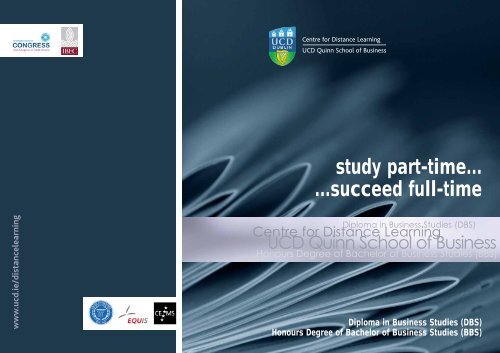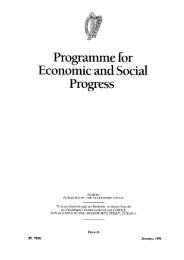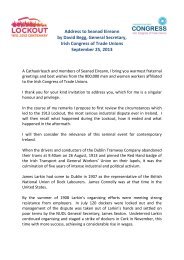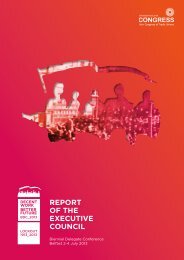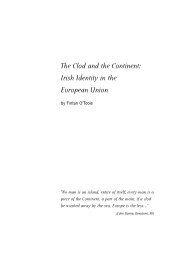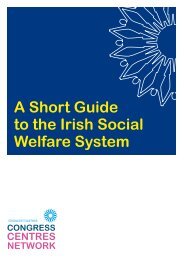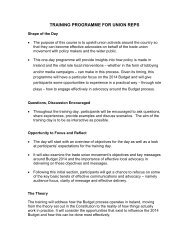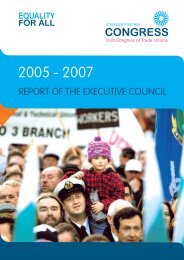BBS Prospectus.pdf
BBS Prospectus.pdf
BBS Prospectus.pdf
You also want an ePaper? Increase the reach of your titles
YUMPU automatically turns print PDFs into web optimized ePapers that Google loves.
Centre for Distance Learning<br />
UCD Quinn School of Business<br />
study part-time...<br />
...succeed full-time<br />
www.ucd.ie/distancelearning<br />
Diploma in Business Studies (DBS)<br />
Centre for Distance Learning<br />
UCD Quinn School of Business<br />
Honours Degree of Bachelor of Business Studies (<strong>BBS</strong>)<br />
Diploma in Business Studies (DBS)<br />
Honours Degree of Bachelor of Business Studies (<strong>BBS</strong>)
Ireland’s leading<br />
business school<br />
Competing with the<br />
world’s best<br />
UCD Quinn School of Business is Ireland’s leading business<br />
school and competes with the very best in Europe and the world.<br />
We are one of an elite group of universities worldwide with the<br />
triple crown of AACSB (International), EQUIS and AMBA accreditations,<br />
and the only school in Ireland to have these awards.<br />
We have a reputation for producing excellent graduates. We<br />
are constantly striving to maintain and enhance that reputation by<br />
developing our programmes and state-of-the-art facilities to<br />
equip our students to meet the challenges of an ever-changing<br />
business world.<br />
UCD Quinn School of Business offers a range of undergraduate<br />
programmes, including a part-time diploma and degree for<br />
mature students: the Diploma in Business Studies (DBS) and the<br />
Bachelor of Business Studies (<strong>BBS</strong>). We also offer a number of<br />
full-time programmes including degrees in Commerce,<br />
Commerce (International), and Economics and Finance.<br />
Contents<br />
First-class support 4<br />
What’s involved 5<br />
Down to business 6<br />
The value of mature students 7<br />
Onwards and upwards 8<br />
Study from anywhere 9<br />
Flexible admissions policy 10<br />
The next step 11<br />
‘There is no<br />
typical profile of a<br />
student, and their<br />
motives for choosing<br />
the programme are<br />
as diverse as their<br />
backgrounds’<br />
Diploma/Bachelor<br />
in Business Studies<br />
A new opportunity for<br />
mature students<br />
The four-year part-time Bachelor of Business Studies (<strong>BBS</strong>)<br />
programme offers would-be students the chance to get a comprehensive<br />
business education and, ultimately, an honours degree —<br />
without putting the rest of your life on hold.<br />
Students who successfully complete the first two years of the<br />
programme are awarded a Diploma in Business Studies (DBS).<br />
Designed for adult and second-chance learners, everything<br />
about the programme is focused on the needs of mature students<br />
— even the admission requirements, which are based on<br />
age, work and life experience and academic aptitude.<br />
Attendance at lectures in UCD Quinn School of Business is limited<br />
to just six weekends — Fridays and Saturdays — each year.<br />
Continuous assessment on assignment work accounts for at least<br />
50% of the marks for each module.<br />
Home study is supported by weekly study plans and specially<br />
designed study guides. To help students get back into learning<br />
mode, an entire module in the first semester is dedicated to<br />
study and learning skills development and essay and business<br />
report writing.There is also a full range of supports available<br />
to help students make the most of their learning<br />
experience.<br />
There is no typical profile of a student. Participants so far<br />
have ranged in age from 21 to 65 and have included teachers,<br />
train drivers, union officials, administrators/managers, civil<br />
servants and small business owners.Their motives for choosing<br />
the programme are as diverse as their backgrounds and have<br />
included wanting to improve personal development/satisfaction,<br />
job prospects, change career or go on to further study.<br />
2 www.ucd.ie/distancelearning<br />
www.ucd.ie/distancelearning 3
What’s involved<br />
Committing to the future<br />
‘The Centre for<br />
Distance Learning<br />
provides first-class<br />
support’<br />
“The study skills classes<br />
at the beginning were<br />
very reassuring for me”<br />
As I left school at 16 with very little education,<br />
the study skills classes at the beginning<br />
were very reassuring for me. Orna Ryan from<br />
the distance learning staff said to me:‘Don’t<br />
be worrying, we’ll ease you back into it’.<br />
The Centre for Distance Learning is fantastic.<br />
They’re very good at responding to you,<br />
you’re never left on your own.You can also<br />
run things by your personal tutor to see<br />
if you’re on the right track.<br />
Greg Cooney, third-year student<br />
The team provides ongoing advice and support<br />
First-class<br />
support<br />
Backing you all the way<br />
There’s no denying that taking on a business degree is a challenge.<br />
That’s why UCD Quinn School of Business puts such emphasis on<br />
providing a support network second to none.<br />
For a start, the course tutors have a wide experience of teaching<br />
mature students.The Centre for Distance Learning is always on hand<br />
to provide advice on getting back into study and tackling essays and<br />
assignments. Each student has access to their own personal tutor for<br />
one-to-one advice.<br />
Students receive regular feedback on their written work and<br />
examination performance. They also develop learning strategies in<br />
the specially designed study skills modules throughout the course.<br />
There is a study guide for each module to help plan study schedules<br />
on a week-to-week basis.<br />
The college library resources include extensive collections of<br />
books and periodicals as well as a range of facilities. Study groups for<br />
students located around the country also provide an ideal forum for<br />
discussing course topics — and for comparing notes on balancing<br />
student, work and family life generally.<br />
The programme consists of three stages of study. A Diploma in<br />
Business Studies (DBS) is awarded at the end of Stage 1, which takes<br />
two years to complete. Stage 2 covers the third year and Stage 3 covers<br />
the fourth. Following the successful completion of Stage 3, an honours<br />
degree of Bachelor of Business Studies (<strong>BBS</strong>) is awarded by the<br />
National University of Ireland.<br />
Each year of the programme involves approximately 12 days of<br />
attendance at the university. This is usually divided into six weekends,<br />
covering Friday and Saturday. The academic year is made up of two<br />
semesters of around 18 weeks each. Semester 1 starts in September<br />
and is followed by examinations in January. Semester 2 begins in late<br />
January and is followed by exams in May.<br />
Students generally study three modules each semester. Each module<br />
is based on a specially written study guide, a course textbook,<br />
continuous assessment and feedback through written assignments<br />
and class participation with the module tutor.<br />
At the end of each semester, students sit written examinations in<br />
each module. In general, each module also has two marked assignments,<br />
which will account for at least 50% of the subject marks.<br />
The annual fee covers registration for the academic year, textbooks,<br />
study guides, setting and marking of assignments, tuition and academic<br />
support. Fees are payable in two instalments before the beginning of<br />
each semester. Students are entitled to tax relief on the fees.<br />
For further information on the current programme fees and the<br />
closing date for the next intake, please go to www.ucd.ie/<br />
distancelearning.<br />
Typical structure of an academic year<br />
Mid-August: Introductory weekend for first-year students<br />
Semester 1<br />
Early September:<br />
Mid/late October:<br />
Mid/late November:<br />
Mid-January:<br />
Semester 2<br />
End of January:<br />
Mid/late March:<br />
Mid/late April:<br />
End of May:<br />
Block-release weekend — Friday & Saturday<br />
Block-release weekend — Friday & Saturday<br />
Block-release weekend — Friday & Saturday<br />
Examinations<br />
Block-release weekend — Friday & Saturday<br />
Block-release weekend — Friday & Saturday<br />
Block-release weekend — Friday & Saturday<br />
Examinations<br />
To be successful at providing higher<br />
education in part-time mode, institutions<br />
have to be sensitive to the particular<br />
needs of mature students returning to<br />
study.<br />
At UCD School of Business we distinguish<br />
ourselves in the infrastructure of<br />
student supports that we have developed<br />
around the programme over the past<br />
decade. Our three modules covering study<br />
and exam skills and communications<br />
competencies are tailored for students<br />
returning to study.These reflect best<br />
practice and lead the field in higher<br />
education in Ireland.<br />
Our support staff are educated to master’s<br />
level in business and related subjects,<br />
so they are available to advise students on<br />
day-to-day problems they may have in relation<br />
to course work and study.<br />
Tom Murphy, Programme Director<br />
4 www.ucd.ie/distancelearning<br />
www.ucd.ie/distancelearning 5
“A broad, generic<br />
qualification”<br />
This is a broad, generic qualification that<br />
you can use in any way you see fit to further<br />
or change your career. It’s designed<br />
around the learning needs of adults, but is<br />
a broad degree.<br />
We recommend it very strongly.<br />
We’d encourage people from a variety<br />
of backgrounds, who would have taken<br />
various bits of adult learning, to go on<br />
to do the <strong>BBS</strong>.<br />
Peter Rigney, Union Services Officer,<br />
Education and Training, ICTU<br />
“The part-time element is critical”<br />
One of the key elements of this course is the second-chance<br />
aspect, from the perspective of it being aimed at mature<br />
students who are in the working environment.The part-time<br />
element is critical. People who are working will very rarely<br />
become full-time students.<br />
It is a very practically based course in terms of the business<br />
approach and content.<br />
Gavin Marie, Divisional Director, IBEC<br />
Down to business<br />
Real-world focus<br />
The programme, which is both practical and academic, covers a<br />
broad range of business modules, and includes some provision for<br />
student choices. Subject areas include economics, marketing, organisational<br />
behaviour, employee relations, human resources (HR) and<br />
business strategy.<br />
The programme is aimed at students who wish to progress in<br />
their careers and enhance future career support. Its core and elective<br />
modules are designed to reflect the issues, challenges and<br />
changing needs of today’s business environment.<br />
While it is a general business programme, it has evolved from an<br />
industrial relations/HR partnership which was developed between<br />
UCD, ICTU and IBEC. Students today have the option of specialising<br />
in industrial relations and HR or in general management.<br />
Rather than specialising in a particular area, they can also make<br />
choices each year based on the subjects that are of most interest<br />
to them.<br />
The value of<br />
mature students<br />
Making experience count<br />
Some mature students tend to overlook their own worth<br />
and not realise the value of the skillsets they bring to the<br />
programme.<br />
The average age of students on the course is 34, so it’s not<br />
surprising that they come equipped with a wealth of work — and<br />
indeed life — experience behind them.<br />
They tend to be highly motivated and committed to their studies<br />
and are a great advertisement for the value of second-chance<br />
education.That’s probably why they win such glowing praise from<br />
their tutors.<br />
Managing your time<br />
It’s a balancing act to combine study with personal,<br />
social and work commitments, so it’s a good idea<br />
when applying for the programme to take stock of<br />
the time you will have available to study.<br />
Before taking on the course you should discuss<br />
your plans with your family, employer and friends.<br />
They will need to provide support and encouragement,<br />
especially around assignment and exam time.<br />
Because these learners are in a work environment<br />
while studying, their experience and learning crystallises<br />
in their minds and gives them a framework.<br />
For people in any job their quality and expertise is<br />
gained from knowledge and experience. If they’re gaining<br />
the knowledge and experience in parallel, there’s a synergy<br />
there.<br />
I give students practical assignments and they have<br />
to apply them in work.That’s the great thing for them;<br />
I feel very strongly about that.<br />
Michael Nelson, Lecturer, Management<br />
Mature students might feel that young<br />
people have all the opportunities. Society<br />
leads them to believe that young people<br />
are the ones who count, or that they’ve<br />
missed their chance, but this is far from<br />
the case.<br />
The great advantage is that they have<br />
such a wide range of experience. In class<br />
they will argue and say:‘That won’t work in<br />
my organisation’, and we discuss why not.<br />
They provide you with the scenarios into<br />
which they put their teaching.<br />
You always come out recharged after a<br />
class with them. I rely on them to tell me<br />
what is going on in organisations; I feed off<br />
them as much as they feed off me!<br />
Geraldine O’Brien, Senior Lecturer, Industrial<br />
Relations and Human Resources<br />
6 www.ucd.ie/distancelearning<br />
www.ucd.ie/distancelearning 7
My decision to specialise in industrial<br />
relations/HR was very much driven by my job<br />
at the time as an advisory officer in the<br />
Labour Relations Commission.The mix of<br />
business, industrial relations and HR wrapped<br />
up in the <strong>BBS</strong> programme was perfect for my<br />
needs.<br />
I’ve since moved to the Organisational<br />
branch in the Revenue Commissioners, which<br />
is really a business analysis area, but I found<br />
that many elements of the course were just<br />
as applicable there.The <strong>BBS</strong> programme has<br />
equipped me with new skills and developed<br />
my existing skillset to make me marketable<br />
in a number of different areas.<br />
Pat Mulhall, <strong>BBS</strong> Graduate 2007<br />
“The knowledge you get is<br />
immediately applicable in the<br />
workplace”<br />
I chose the <strong>BBS</strong> because it gives you accreditation<br />
that’s recognised worldwide and it involves exams,<br />
which make you work that bit harder to retain the<br />
knowledge.<br />
I manage a medical practice with two surgeries<br />
and felt that the subjects covered in the <strong>BBS</strong> were<br />
very applicable to my job.<br />
The programme has helped me to deal with<br />
different situations that have come up in my work<br />
over the past couple of years.When you’re working<br />
and studying, much of the knowledge you get is<br />
immediately applicable in the workplace and that<br />
makes the process far more interesting.<br />
Marian Brennan, third-year student<br />
Onwards and<br />
upwards<br />
Long-term career benefits<br />
For those interested in moving into or upwards in general<br />
business/management, industrial relations or human resources<br />
(HR), the programme provides a very broad foundation in business.<br />
It also offers excellent opportunities for postgraduate study.<br />
The programme helps students to develop:<br />
■ A solid and practical understanding of business and<br />
the management of organisations<br />
■ The necessary technical, knowledge-application,<br />
communication, team-building and leadership skills<br />
consistent with the changing needs of modern business<br />
and organisational management<br />
■ Analytical and critical thinking skills to help facilitate<br />
lifelong learning and demands for personal development<br />
and confidence building.<br />
You can benefit instantly from the programme’s practical<br />
element, which will often be applicable to your own workplace.<br />
Graduates, meanwhile, gain an internationally recognised<br />
degree with the coveted AACSB (International), EQUIS and<br />
CEMS accreditations, enabling them to pursue their career<br />
wherever they want, in Ireland or abroad.<br />
At the moment, my partner is working in Israel for<br />
a year, so I took a sabbatical to join him.<br />
Being so far away from home, it was comforting to<br />
know that you could contact anyone at the programme<br />
at any time — to ask a question, clarify any issues or<br />
put your queries to the lecturers, if necessary.<br />
I really think this course has just the right amount of<br />
flexibility. It takes into account the fact that the students<br />
are all studying part-time, while also juggling jobs and<br />
family commitments. However, it also has the correct<br />
amount of scheduling to help maintain some level of<br />
discipline, which is essential to getting through the<br />
course work.<br />
Siobhan O’Neill, fourth-year student<br />
based in Israel<br />
Study from<br />
anywhere<br />
Home or away<br />
A key advantage of the programme is that participants can study<br />
at a time and in a place that best suits them. Some students have<br />
even undertaken the programme while based outside Ireland, in<br />
locations such as Florida, Switzerland, the Netherlands, Germany, the<br />
UK, Luxembourg and France.<br />
As continuous assessment accounts for at least 50% of the marks<br />
awarded for each module, there is huge flexibility as to where many<br />
of the assignments can be completed. And there is plenty of ongoing<br />
support to ensure that students do not feel isolated, whether<br />
they’re in Dublin or Dubrovnik.<br />
For example, the programme website provides online access to<br />
all course correspondence and materials, while a discussion board<br />
and chatroom allow students to interact with each other, no matter<br />
where they are.<br />
Participants do need to be able to commit to attending classes for<br />
around three weekends each semester. These sessions, which<br />
provoke highly engaging class debates, provide an excellent opportunity<br />
for regular face-to-face interaction with tutors and other<br />
classmates.<br />
8 www.ucd.ie/distancelearning<br />
www.ucd.ie/distancelearning 9
Flexible admissions<br />
policy<br />
Age, work and life experience<br />
‘Admission may be<br />
based on age, work and<br />
life experience and<br />
learning aptitudes’<br />
Entry to the programme may be sought on two grounds:<br />
mature years and matriculation.<br />
Mature years<br />
To qualify on the basis of mature years, you must be at least 23<br />
years of age on the 1st January of the proposed year of entry.<br />
Suitability will be based on age, work and life experience that is<br />
relevant to the course, and academic aptitude. The assessment<br />
process may include an interview and a writing skills test.<br />
Matriculation<br />
You may also qualify if you are at least 21 years old on the 1st<br />
January of the proposed year of entry and have fulfilled the Leaving<br />
Certificate requirements of the National University of Ireland.<br />
Exemptions<br />
You may qualify for an exemption from Stage 1 (the first two<br />
years) if you hold a HETAC Certificate or Diploma in Business<br />
Studies (with a grade of merit or above) or an equivalent qualification.<br />
English language<br />
Applicants who have not previously studied in English must<br />
meet the university’s English language requirements.<br />
“One of my ambitions deep down was<br />
to better myself through education”<br />
I left school after the Intermediate Certificate in 1976 to serve an apprenticeship<br />
but one of my ambitions deep down was to better myself through education.<br />
Through a role as shop steward I realised I had a flair for industrial relations.<br />
The <strong>BBS</strong> was the ideal course for me to achieve a degree and give me the<br />
qualifications needed to apply for positions in this area.<br />
In my early 40s I was conferred with a first-class honours degree and<br />
I went on to become an industrial relations officer with the Irish Bank<br />
Officials Association.<br />
The next step<br />
Need advice on your application<br />
Contact us through our website, by email,<br />
by phone or by post.<br />
To download an application form, log on to:<br />
www.ucd.ie/distancelearning<br />
bbs@ucd.ie<br />
+353-1-716 4821 / 716 4738 / 716 4818 / 716 4749<br />
Centre for Distance Learning<br />
UCD Quinn School of Business<br />
University College Dublin<br />
Belfield<br />
Dublin 4<br />
Ireland<br />
Michael Meegan, <strong>BBS</strong> Graduate 2001<br />
10 www.ucd.ie/distancelearning<br />
www.ucd.ie/distancelearning 11


